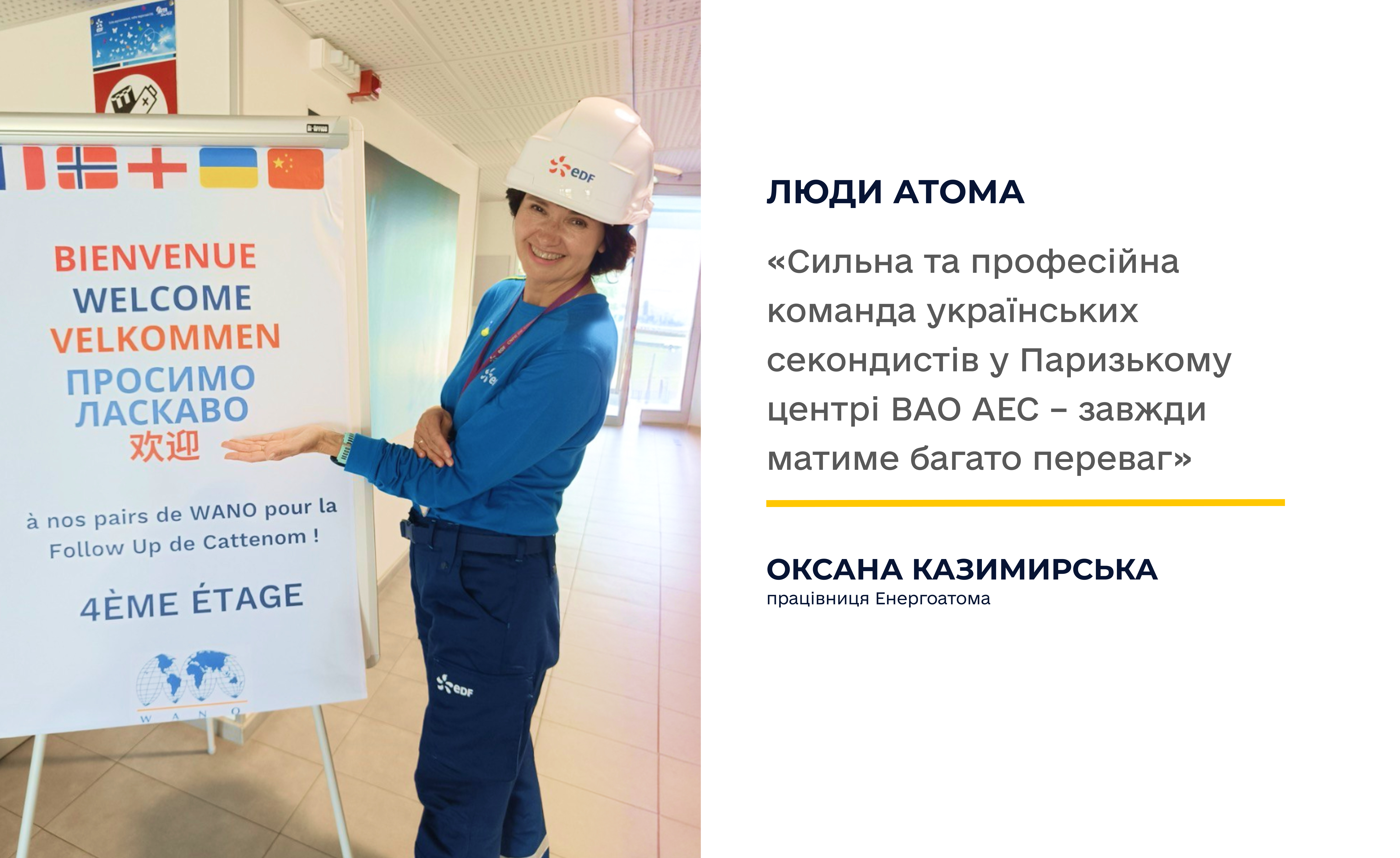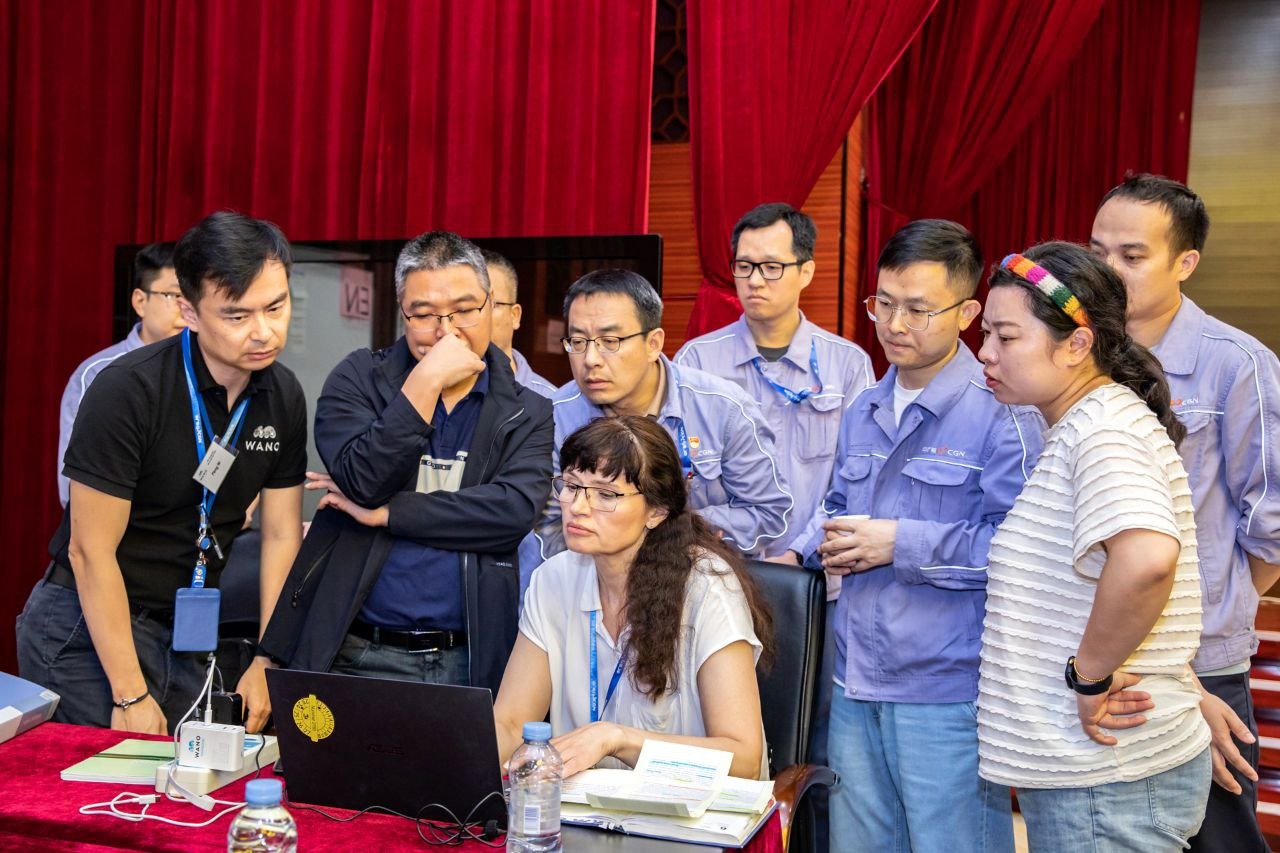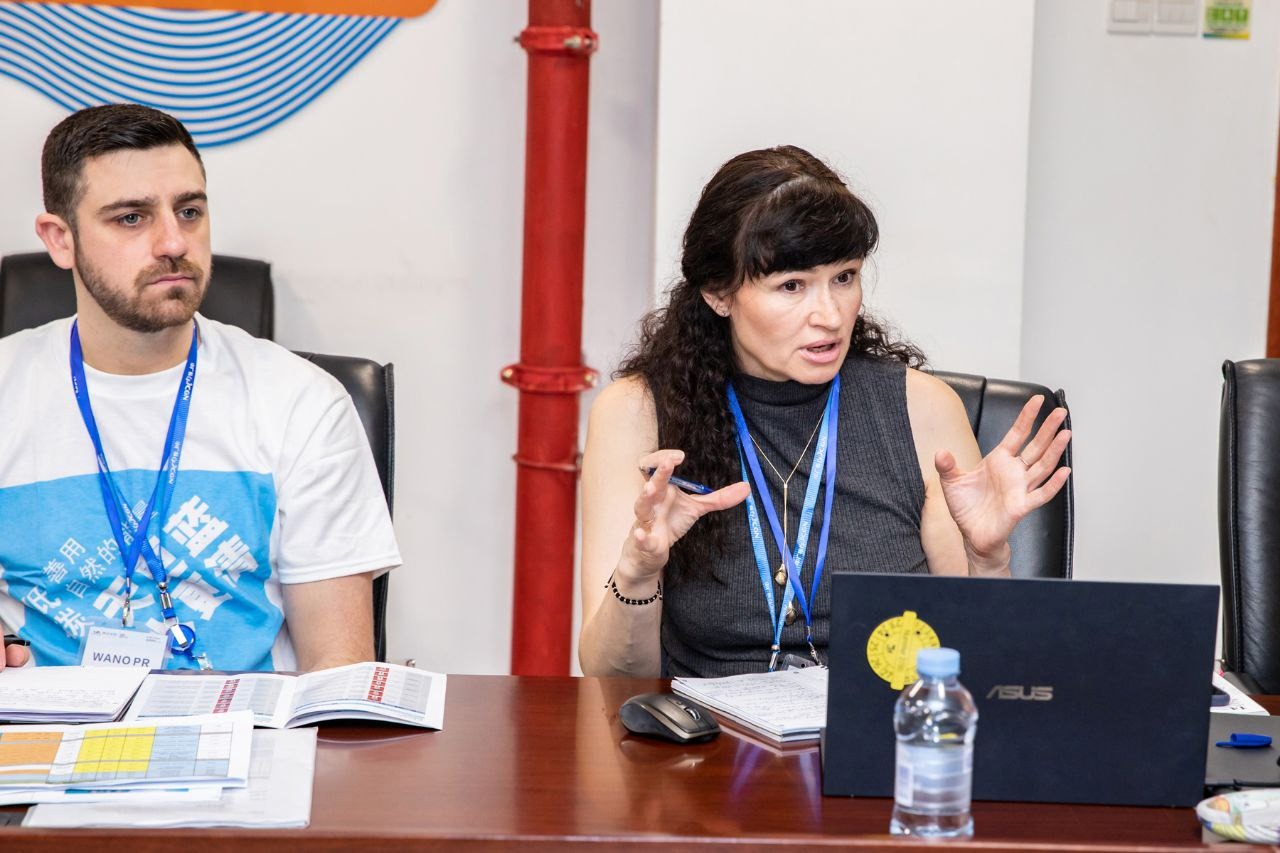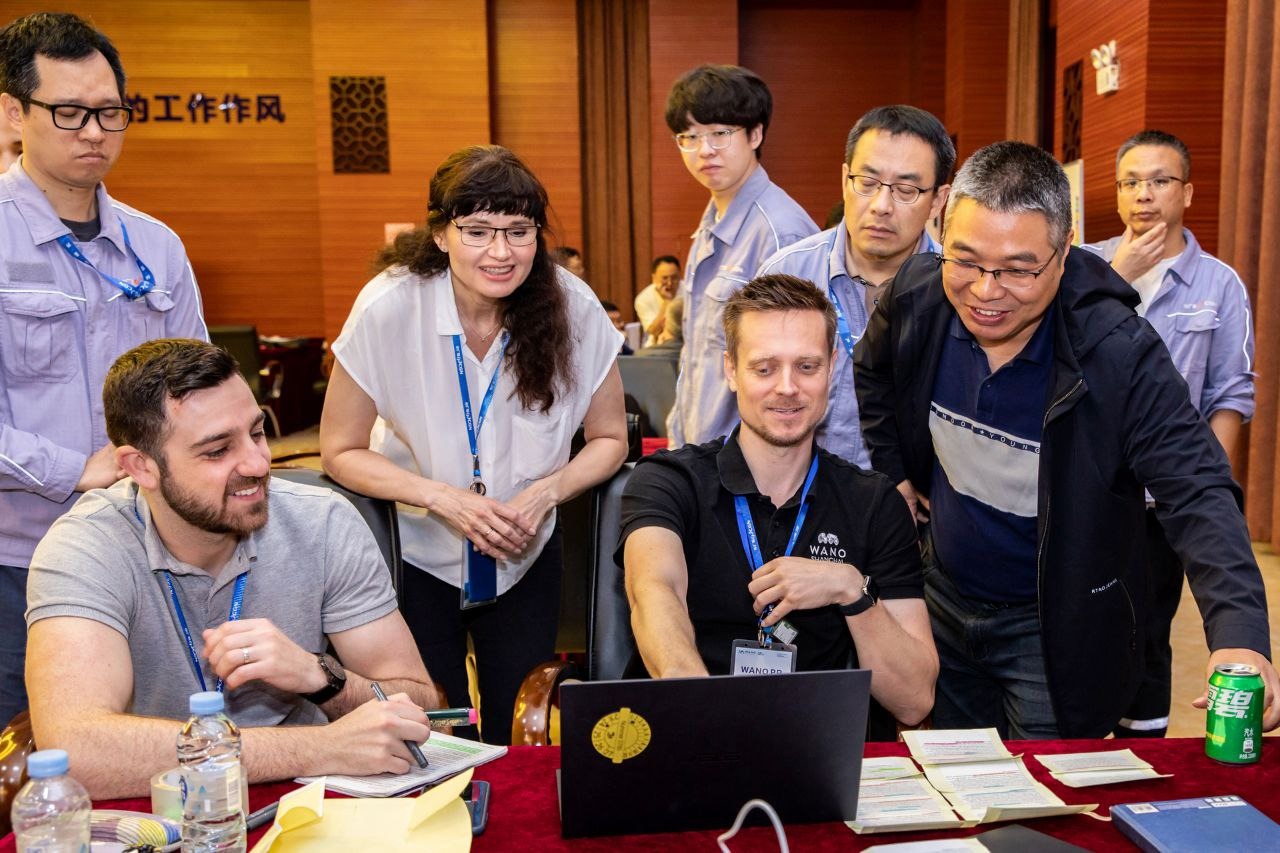
Energoatom is a member of the Paris Center of the World Association of Nuclear Power Plant Operators (hereinafter referred to as WANO PC). 6 employees of NNEGC have been delegated to participate in the activities of the Paris Center under various programs. These are experienced technicians from Ukrainian NPPs who have passed the selection process and received the status of secondees.
Secondees (from the English “secondee”) are industry experts who are not permanent employees of the Paris Center, but are seconded there from their plant or company under a contract for 2-3 years. Such specialists should work out the best world practices of NPP operation, analyze international experience and share it during peer reviews at NPPs
Our interlocutor, Oksana Kazymyrska, an engineer from the Rivne NPP and a participant in a number of international projects, is one of the most experienced secondees from Energoatom at WANO Paris Center. She was one of the first Ukrainian specialists delegated by NNEGC to participate in the programs of WANO PC, in particular, NPP peer reviews.
- Oksana, could you tell us what preceded your work at WANO Paris Center? How did you build your career in nuclear power industry?
- All my previous professional path in nuclear energy, since 1996, is related to the Rivne Nuclear Power Plant. The most interesting period began when I joined the process of extending the life of power units 1 and 2 – within the framework of the Department of Reliability, Resource and Lifetime Extension, which was the new one as of that time. This is comprehensive engineering work: development of documentation, inspection and assessment of the equipment technical condition, calculations, etc. The RNPP was the first in Ukraine on that path, so we were receiving a unique experience. There were many difficult tasks, but it was fascinating. After all, you work – and you feel the scope of your activities, you see the result. Many modifications and modernizations of equipment were being introduced.
And since 2010, the RNPP entered a state of overtime operation of mentioned units – and it was time to manage the equipment aging. As part of the cooperation between Ukrainian and Swedish regulators, a project was initiated to develop requirements for aging management and long-term operation. I was involved as a representative of the RNPP to it. A representative of the US regulator worked with us, since the Americans already had considerable achievements: researches, documentation, and results. The American Project on General Aging Lessons Learned (GALL) was the first. Subsequently, the IAEA started a similar international one (IGALL), Ukraine invited Viktor Kozlov, a representative of the Directorate of Energoatom, to participate in it and me. There is no doubt that all those things gave a good professional boost.
- Thus, it is quite predictable that with such experience you started to work, as a representative of Energoatom, in the team of secondees of WANO PC.
- When they offered that to me, I decided to try. Self-development is very important to me. Therefore, I wanted to immerse myself in interesting work, with new tasks and challenges. I passed the selection interviews, and I have been working at WANO PC for almost three years.
- What was the activity in the Paris Center like for you from the beginning? Did you have to overcome challenges or, on the contrary, did everything go as smooth as silk?
- My first “partner” at the Flamanville NPP in France was a great exam for the position of secondee! Allegedly thrown into the water – and you should swim out. When there is no practical experience of participating in such missions, it is very difficult for the first time. Although it was essentially a test job, I had to work like all my colleagues: conduct interviews, develop reports, etc. In addition, foreign language environment, when there is no one to talk to in your native language for a month. I am now adapted. However, at that time – the only woman in the team, a newcomer, no one else from Ukraine... However, there was support at the team level. It helped to overcome all the challenges.
- Where and how did your first independent peer review take place?
- Also in France, at the Blayais NPP. That mission was also well remembered. I was already an engineering manager. Besides me, two more novice experts worked in this direction, for both of them it was the first peer review. Of course, it was difficult, but we managed. The experience of my test “partner” helped me, because both plants were in the EDF Company, so the organization of work, structure, areas of activity, engineering tasks – everything was very similar.
- You work at WANO PC in the area of engineering. Please explain what it covers. Were there any challenges? Did you need to study more?
- Engineering is a broad area of work, one of the most complex. It covers many fields, from equipment reliability, failure prevention, operational support to configuration management, including modifications, as well as long-term reliability of structural materials, nuclear fuel, chemistry, and more. Accordingly, many problems arise during peer review. There are challenges and the need to learn – you constantly work and improve with these.
- Tell us about the role of communication in the work of secondees? After all, the level of openness of the plant is also determined during peer reviews.
- If relations with counterparts (NPP representatives) are built on the principles of trust, this is a decisive contribution to the success of peer review. Of course, many things depend on the plant openness. However, there is also their dependence on the ability of experts to communicate successfully. Therefore, in addition to technical knowledge, attention is paid on communication skills during interviews with candidates for the positions of secondees.
Regarding the NPP openness: if the plant provides information, demonstrates where there are pros and cons, then experts can assess the problems and provide useful recommendations. Nevertheless, when the plant is not open enough, it is difficult to make an objective conclusion about its activities. Therefore, as one of the leaders of the Paris Center emphasizes, the money that the plant spent on peer review is wasted, because expectations are not met.
- So, how should it be so that money is not been spent like water?
- There must be an awareness: experts and counterparts work as a single team to improve the operation of the plant, to reach a higher level of its operation. During the interview, we always emphasize that we are not inspecting, but trying to help. Accordingly, the peer review report is balanced: both weak points – areas for improvement, as well as strengths, positive practices that can serve as an example for other NPPs should be specified.
- How is communication built in a team, because people from different countries work together?
- A strong team spirit is a feature of the Paris Center, its strength. Three weeks of a peer review mission means daily communication in a team with the same people. The work is stressful, but our relations are openness, exchange of information, cooperation, and if necessary – advice, support, etc.
- How do you feel when you see during a follow-up peer review that your work has not been performed in vain?
- The follow-up peer review, which takes place after two years, is a more positive mission for me. You can see the results, because the plant always strives to demonstrate how many things been done based on the recommendations of experts.
- This year you were on the follow-up mission at the Leibstadt NPP, Switzerland. What are your impressions?
- The Leibstadt NPP has one unit with a capacity of 1220 MW, it was put in operation in 1984. At the follow-up peer review, we saw that the plant achieved certain results in eliminating the deficiencies by the results of the previous peer review. However, the condition of the diesel generator caught the eye most during the tour at that NPP. This diesel generator has been working for 40 years, but it looks like it just came off the assembly line. Even the paint is still factory, as counterparts said, shiny like a new one. Such high-quality production, by the way, is German; and it is worth to mention its impeccable operation. I have never seen such an ideal technical condition of a diesel generator at any nuclear power plant I have visited.
- Is there already in your practice familiarity with such experience, which should be spread to Ukrainian nuclear power plants?
- Currently, WANO is working on a new area – “Enhanced monitoring”. If the nuclear power plant is already covered by this program, then the next peer review for it should not be in 4 years, but in 6. It is not planned to conduct a follow-up mission at all, because the NPP is already under monitoring. I think this is a very interesting experience for improving the plant activities. The enhanced interaction of the NPP with the PC experts is aimed at comprehensive support of the sites.
- Is the experience of Ukrainian NPPs in demand in Paris Center?
- In general, the Ukrainian nuclear power industry is highly professional. We have extensive operating experience. Especially now – when the employees of power industry work in extremely difficult conditions. We have something to share with the world. And recently, I was very proud of the speech of my colleague from the RNPP, Denys Havrylov at the WANO PC workshop, where he presented our experience in certifying equipment for severe conditions and seismicity. Therefore, as he said, we are in the fairway of the world's leading NPPs.
- So far, you are the only woman in the group of Energoatom secondariesees. But,how many women are there among your colleagues in the Paris Center?
- In my opinion, the profession of a nuclear employee is no longer considered a men’s occupatiion. In Paris Center, there are enough female engineers who work and lead engineering and other areas, even operations. It is significant that the Director of Paris Center since January of this year has been Satu Katajala – a woman who has passed all the steps of the career ladder in nuclear energy. The Chooz NPP in France is headed by a woman. There are many other examples of successful careers of women in the nuclear industry.
- In your opinion, why is it important that specialists of Energoatom, Ukrainian NPPs participate in WANO activities?
- If we want to be a full-fledged and active part of the international organization, our specialists should be there. When you represent your plant, company, country – you share your experience, in your turn, you get information about practices from other companies and countries that can be applied on our sites. You learn, take part in WANO activities, expand your knowledge, which you can later pass on to your colleagues in Ukraine.
I also consider it very important to present the high professionalism of Ukrainian power industry employees to the world. Moreover, we definitely have something to be proud of, as proven by the last two years of the war. In addition, direct contact with foreign colleagues works best here. Remote communication definitely does not have such an influence; I felt this for myself when I returned in 2023 to PC after a one-year break in 2022 due to the war. Therefore, a strong and professional team of Ukrainian secondees at the WANO Paris Center will always have many advantages.
- What would you wish for future Ukrainian secondees?
- Every success, good luck and don't be afraid of new challenges. Moreover, it is necessary to know that their journey to a new country can sometimes take place only outside the window of a car, bus or train, and this new country will be associated only with a certain nuclear plant. Nevertheless, definitely with new interesting people.
- You travel around the world, see NPPs of various designs, cities, and people. What would you like to say about your plant, town, colleagues, and compatriots?
- I love my plant, because almost all my professional experience was acquired at the RNPP, I am very grateful to it, as I am grateful to my team, from which I am, which I also love very much. In general, we have highly professional specialists in all the departments. I love my cozy town, people, White Lake that is a source of energy. All these things and aspects ours, native, unique.



